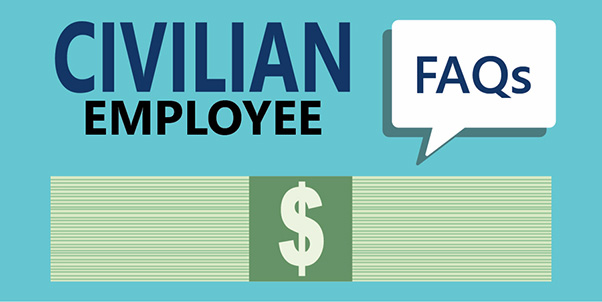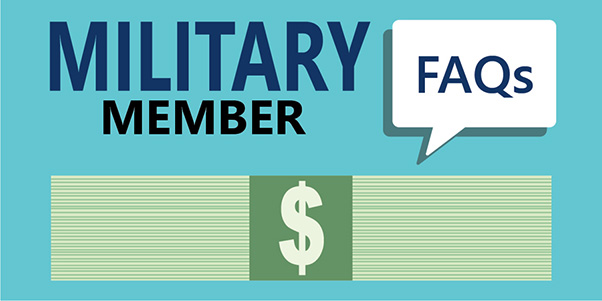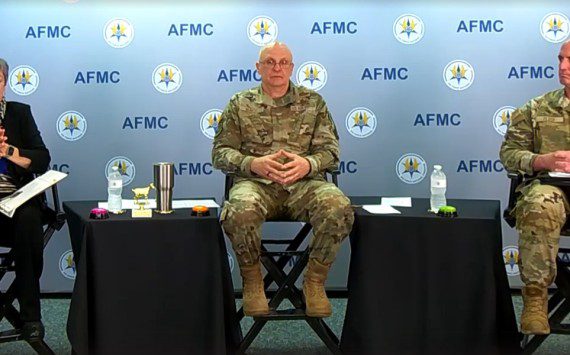In order to provide relief during the COVID-19 pandemic, a Presidential Memorandum was issued on Aug. 8, 2020, and guidance followed from Internal Revenue Service on Aug. 28, 2020, to temporarily defer Social Security (Old Age, Survivors, and Disability Insurance (OASDI)) tax withholdings.
This change is effective through the end of the 2020 calendar year.
Military members
Effective for the September mid-month pay, DFAS will temporarily defer the withholding of your 6.2 percent Social Security tax if your monthly rate of basic pay is less than $8,666.66.
If your monthly rate of basic pay is at or above this threshold, your social security tax withholding will not be affected by the temporary deferral.
Military members can use their August or prior LES as a good reference for their typical Social Security tax amount. The Social Security tax is labeled as “FICA-SOC SECURITY” on the LES and is calculated as 6.2 percent of basic pay.
Civilian Employees
Effective pay period ending Sept. 12, 2020, DFAS will temporarily defer your 6.2 percent OASDI tax withholding if your wages, subject to OASDI are less than $4,000 in any given pay period. Employees can use the “Taxable Wages” on the LES as a good reference for whether they will have OASDI tax deferred.
The OASDI deduction is found on your LES under the deductions tab/section.
Military members are not eligible to opt-out of the deferral if their Social Security wages fall within the stated limits. The deferral will happen automatically.
Civilian employees are not eligible to opt-out of the deferral if their Social Security wages fall within the stated limits. The deferral will happen automatically.
Per IRS guidance, collection of the deferred taxes will be taken from your wages between Jan. 1 and April 30, 2021, for both military members and civilian employees. Additional information on the collection process will be provided in the future.
If a military member or civilian employee separates or retires in 2020 before the Social Security tax can be collected in 2021, they are still responsible for the Social Security tax repayment. Additional information on the collection process will be provided in the future.
For questions on the temporary deferral of the 6.2 percent OASDI withholding:
* Visit the IRS page: https://www.irs.gov/newsroom/guidance-issued-to-implement-presidential-memorandum-deferring-certain-employee-social-security-tax-withholding.
For more information on financial readiness:
* Visit www.finred.usalearning.gov.
* Visit your installation Military and Family Support Center to speak with a Personal Financial Manager or Counselor, or contact Military OneSource at https://www.militaryonesource.mil (1-800-342-9647).
Still have questions? See the FAQs for more information.
Military Members – Frequently Asked Questions
Q. What is the Social Security tax?
A. Social Security tax is also called the Old Age, Survivors, and Disability Insurance (OASDI) tax and is required by law. The tax funds the Social Security program, which is administered by the Social Security Administration.
Q. Where are the Social Security Taxes shown on my LES?
A. The Leave and Earnings Statement for the Air Force, Army and Navy member list the Social Security taxes as “FICA-SOC SECURITY” within the deductions section. For the Marine Corps this deduction is listed as “Social Security” on the LES.
Q. How is the Social Security tax calculated?
A. The Social Security tax is set by at law at 6.2 percent. The tax is calculated as 6.2 percent of a military member’s basic pay. For example, an E5 with 8 years of service has a monthly basic pay rate of $3,306.30. Assuming the E5 was paid for the whole month of duty, the monthly Social Security tax liability would be calculated at 6.2 percent of $3,306.30, which equals $204.99. Members can use their August or prior Leave and Earnings Statements as a good reference for their typical Social Security tax withholding amount.
Q. Can I opt-out of the deferred Social Security tax withholding?
A. No. The Office of Management and Budget (OMB) directed all Executive Branch Agencies to implement the tax deferral. As such, no Payroll Providers, Departments/Agencies, or service members will be able to opt-in/opt-out of the deferral.
Q. Does this affect any of my other tax withholdings?
A. No. Pursuant to the Department of Treasury and the Internal Revenue Service Guidance, this only affects your Social Security tax withholdings, which will be deferred from September 2020 through the end of the calendar year 2020.
Department of Treasury and the Internal Revenue Service guidance link:
https://www.irs.gov/pub/irs-drop/n-20-65.pdf
Q. What is the wage limit amount for determining who will have their Social Security tax withholdings deferred through the end of calendar year 2020?
A. If your monthly rate of basic pay is less than $8,666.66, your Social Security taxes will be deferred. If your monthly rate of basic pay is at or above the threshold, your social security tax withholding will not be affected by this temporary deferral.
The monthly rate of $8,666.66 is determined as:
The IRS rate of $4,000 is based on a bi-weekly pay schedule (26 pay periods), while your military pay is calculated on a monthly pay schedule (12 months). To convert the bi-weekly rate of $4,000 to monthly, multiply $4,000 X 26 (pay periods) = $104,000 and divide by 12 (months), which will equal $8,666.66 for the monthly rate.
Q. What grades are impacted?
a. Enlisted service members will have their Social Security taxes deferred.
b. Officers at the grade O1-O4, the grade of O5 with less than 16 years of service, and the grade of O6 with less than 14 years of service will have their Social Security taxes deferred.
c. All officers at the grade of 05 with 16 or more years of service, grade of O6 with 14 or more years of service, and all O7s through O10s will not have their Social Security taxes deferred.
d. All warrant officers will have their Social Security taxes deferred except those at a grade of W5 with 24 or more years of service.
Q. When will the payroll tax deferral begin?
A. The deferral of the withholding of the Social Security tax for service members will be effective for mid-month pay September.
Q. Will I be required to pay back the Social Security taxes that are deferred?
A. Yes. Current IRS guidance indicates the payment of the deferred taxes is postponed until January 1, 2021. The deferred Social Security taxes not withheld from wages during 2020 will be collected from your wages between Jan. 1, 2021, and April 30, 2021. Additional information on the collection process will be provided in the future.
Q. How much will my payroll provider collect during each pay period starting Jan. 1, 2021, through April 30, 2021?
A. As more information becomes available on the collection of the deferred Social Security taxes, it will be posted here.
Q. Can the deferred Social Security tax liability be waived?
A. Only Congress has the authority to forgive taxes. Deferral of the Social Security tax only postpones when the taxes are due.
Q. Will the deferred taxes be forgiven by Congress?
A. Congress has not made a determination on forgiving the tax deferral debt. Under current IRS Guidance, service members and civilian employees should plan on repaying the deferred taxes beginning Jan. 1.
Q. Can I select my repayment terms, by lump sum or evenly?
A. Pursuant to current Department of Treasury and Internal Revenue Service Guidance, total deferred Social Security taxes must be withheld evenly from wages beginning Jan. 1, 2001, and ending on April 30, 2021. As more information becomes available on the collection of the deferred Social Security taxes, it will be posted here.
Q. Do I have to pay interest and penalties if not paid after April 2021?
A. As more information becomes available on the application of interest and penalties, it will be posted here.
Q. I am separating from the service before the end of this year; will I be required to pay it back?
A. If you separate or retire in 2020 before the Social Security tax can be collected in 2021, you are still responsible for the Social Security tax repayment. As more information becomes available on the collection of any deferred Social Security taxes, it will be posted here.
Q. How will this affect my 2020 and 2021 W-2?
A. As more information and guidance becomes available from the Internal Revenue Service on how the deferral and collections affect your 2020 and 2021 W-2s, it will be posted here.
Q. Does the Social Security (OASDI) tax deferral impact contributions to my Thrift Savings Plan (TSP) account?
A. No. The OASDI amount collected/deferred does not have an impact on wages that are used to calculate your TSP contributions.

Civilian Employee – Frequently Asked Questions
Q. Why are my OASDI taxes being deferred?
A. In order to provide relief during the COVID-19 pandemic, a Presidential Memorandum was issued on Aug. 8, 2020, and guidance followed by Internal Revenue Service on Aug. 28, 2020, to temporarily defer employees Social Security (Old Age, Survivors, and Disability Insurance) or “OASDI” tax withholdings.
Presidential Memorandum link: https://www.federalregister.gov/documents/2020/08/13/2020-17899/deferring-payroll-tax-obligations-in-light-of-the-ongoing-covid-19-disaster
Q. What is the deferred OASDI tax?
A. Social Security is 6.2 percent and is commonly referred to as OASDI. OASDI stands for Old Age, Survivors, and Disability Insurance program. The tax funds the Social Security program, which is administered by the Social Security Administration. Your OASDI deduction is found on your LES under the deductions tab/section.
Q. How is the OASDI tax calculated?
A. OASDI tax is set by law at 6.2 percent. The tax is calculated as 6.2% of wages that are subject to OASDI. Wages subject to OASDI are gross wages less Federal Employees Health Benefits (FEHB), Dental, Vision, and Health/Flexible Spending Accounts (HSA/FSA). A good reference on your LES is your Taxable Wages listed on the Summary tab in myPay.
Q. Can I opt-out of the deferred OASDI tax withholding?
A. No. The Office of Management and Budget (OMB) directed all Executive Branch Agencies to implement the tax deferral. As such, no Payroll Providers, Departments/Agencies, employees or service members will be able to opt-in/opt-out of the deferral.
Q. Does this affect any of my other tax withholdings?
A. No. Pursuant to the Department of Treasury and the Internal Revenue Service Guidance, this only affects your Social Security tax (OASDI) withholdings, which will be deferred from September 2020 through the end of the calendar year 2020.
Department of Treasury and the Internal Revenue Service guidance link:
https://www.irs.gov/pub/irs-drop/n-20-65.pdf
Q. What is the wage threshold amount for determining who will have their Social Security tax (OASDI) withholdings deferred through the end of calendar year 2020?
A. If your wages subject to OASDI are less that $4,000 per pay period, OASDI taxes will be deferred. Wages subject to OASDI are gross wages less Federal Employees Health Benefits (FEHB), Dental, Vision, and Health/Flexible Spending Accounts (HSA/FSA).
Q. When will the payroll tax deferral begin?
A. The elimination of the OASDI tax withholding on employee deductions for the applicable employees will be effective, pay period ending Sept. 12, 2020.
Q. Will I be required to pay back the Social Security taxes that are deferred?
A. Yes. Current IRS guidance indicates the payment of the deferred taxes is postponed until January 1, 2021. The deferred OASDI taxes not withheld from wages during 2020 will be collected from your wages between Jan. 1, 2021, and April 30, 2021. Additional information on the collection process will be provided in the future.
Q. How much will my payroll provider collect during each pay period starting in January 1, 2021 through April 30, 2021?
A. As more information becomes available on the collection of the deferred Social Security taxes, it will be posted here.
Q. Can the deferred Social Security tax liability (OASDI) be waived?
A. Only Congress has the authority to forgive taxes. Deferral of the Social Security tax only postpones when the taxes are due.
Q. Will the deferred taxes be forgiven by Congress?
A. Congress has not made a determination on forgiving the tax deferral debt. Under current IRS Guidance, service members and civilian employees should plan on repaying the deferred taxes beginning January 1.
Q. Can I select my repayment terms, by lump sum or evenly?
A. Pursuant to current Department of Treasury and Internal Revenue Service Guidance, total deferred Social Security taxes must be withheld evenly from wages beginning January 1, 2001 and ending on April 30, 2021. As more information becomes available on the collection of the deferred Social Security taxes, it will be posted here.
Q. Do I have to pay interest and penalties if not paid after April 2021?
A.As more information becomes available on the application of interest and penalties, it will be posted here.
Q. I am separating or retiring before the end of this year; will I be required to pay the deferred taxes back?
A.If you separate or retire in 2020 before the Social Security tax can be collected in 2021, you are still responsible for the Social Security tax repayment. As more information becomes available on the collection of any deferred Social Security taxes, it will be posted here.
Q. How will this affect my 2020 and 2021 W-2?
A. As more information and guidance becomes available from the Internal Revenue Service on how the deferral and collections affect your 2020 and 2021 W-2s, it will be posted here.
Q. Does the Social Security (OASDI) tax deferral impact contributions to my Thrift Savings Plan (TSP) account?
A. No. The OASDI amount collected/deferred does not have an impact on wages that are used to calculate your TSP contributions.













